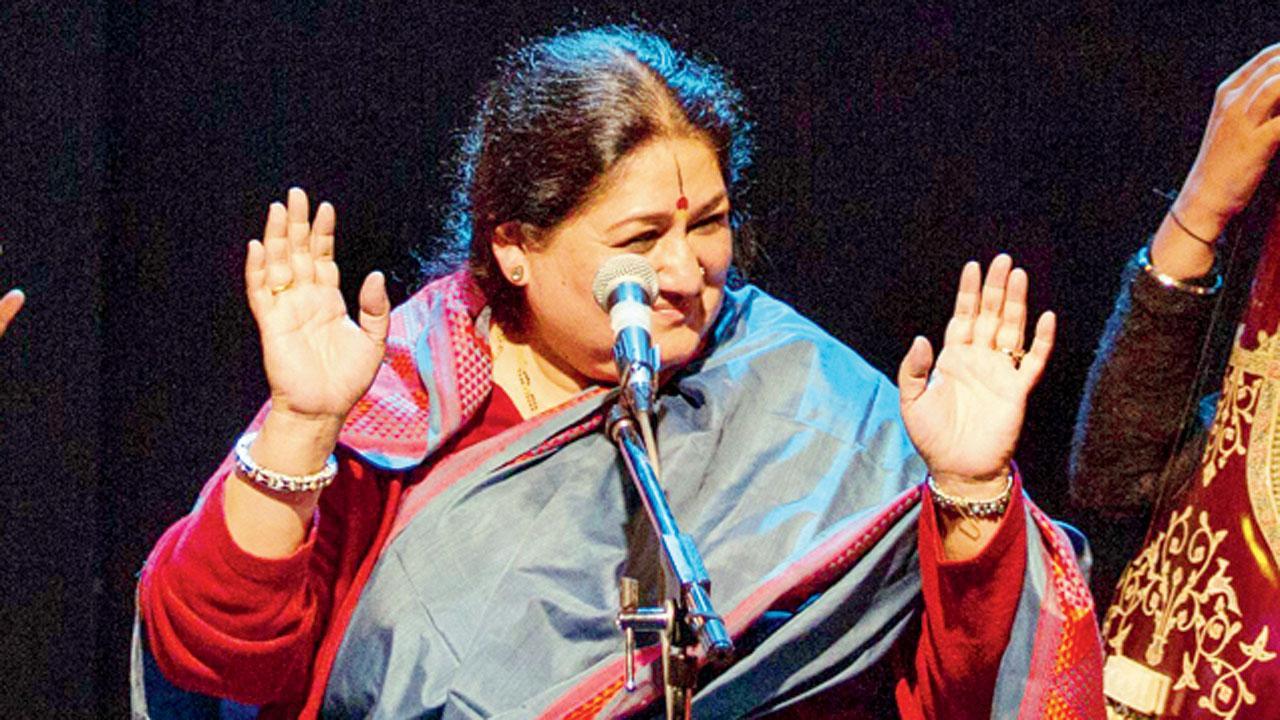As Mumbai gets a taste of 17th century Hindi literature which unabashedly celebrated female sexuality, Shubha Mudgal, who put this poetry to music last week, discusses the message in music

Shubha Mudgal in concert with Aneesh Pradhan on tabla and Sudhir Nayak on the harmonium, presenting poetry that celebrated the woman as goddess, yogini and nayika. PIC COURTESY/DHRUV SETHI
In a fortnight when an FIR was filed against Bollywood actor Ranveer Singh for deciding to pose in the buff for a British magazine and post the images on social media, Hindustani classical vocalist Shubha Mudgal sang for a woman who had a bone to pick with her sister-in-law who labelled her bereft of passion like a Brindavan widow. Perhaps Mudgal, whose repertoire includes thumri and khayal, may have been as baffled as a majority of Indian women, wondering who exactly the Mumbai-based lawyer whose complaint the FIR was based on, was speaking for when she said Singh exposing his “bum” is “a national issue” because it insulted the modesty of women.
At a concert titled, Women, Sexuality, and Song, which opened a women-led Indian classical music festival by the National Centre for the Performing Arts (NCPA) in Mumbai, Mudgal sang for and represented every kind of Indian woman—goddess, yogini and nayika alike, some with immense beauty, others with greying tresses, and then some stigmatised by patriarchy. “Some [of this poetry] celebrates womanhood and sensuality [Dakhin jayiyo ji, ke layiyo hamein Dhanushpuri/Get me a Dhanushpuri saree from the Deccan] and other songs speak of the challenges and stigma women face [Saasu mori kaheli bajhaniya, nanad Brijbasin ho/Rama jinke mein baari re biyahi, ooyi ghar se nikaaren ho/My mother-in-law calls me barren, my sister-in-law says I’m bereft of passion like a Brindavan widow/And the man I was married to when young has abandoned me],” she says.
With performing artistes and actors emerging as soft targets of censorship, was Mudgal worried about the nature of the lyrics? “I have not created this content,” she argues. “This [poetry] has been around and performed for centuries. What is there to protest? Unfortunately, we live in times when there is no a guarantee that no one will be upset.”
Regrettably, the notionally developed nations seem to grant women as little agency over their bodies, sexual pleasure, and reproductive rights. “It [engaging in sex and not only to procreate] is seen as too radical when placed within the historical context where women, especially those from certain castes and class, have been subject to body policing and deprived of the right to explore and experience sexual and sensual pleasure for themselves,” she says, although traditional Hindi folk music and classical Hindi literature has long discussed these themes. “I’ve also included a few pieces of ritikal poetry, which flourished between the 17th and 19th centuries; it is characterised by an emphasis on the sensual. And, rekhti, which is a sort of hybrid Urdu poetry, emphasising feminine sensuality.” During the ritikal period of Hindi literature, the erotic element became predominant and emphasis was on sringaar rasa. It got its name ‘riti’ (‘procedure’) because it was the age when poetic figures and theory were developed to the fullest.
Mudgal’s concerts are known equally for musical form and literary content. She credits this to growing up in a home with professors of English literature for parents. “We had guests streaming in and my father could spend entire evenings discussing the finer details of the lyrics of a qawwali, for instance. My gurus Pt Ramashreya Jha and Naina Devi too loved exploring the intersectional space between music and literature,” she remembers. Over the years, her interest has led to quite a collection of literary masterpieces in poetry. “Family and friends who know of my passion also unfailingly share works which catch their attention and [know that I will appreciate].”
So, when Dr Suvarnalata Rao, Head-Indian Music, NCPA, approached her for the concert, she dipped into this growing collection of verse. “Given the sheer abundance of content and the time spans involved, it is impossible to present a comprehensive selection in one concert. I’ve chosen a diverse selection, both in literary choices as well as music-related choices,” she explains. The works of Dev (1673-1768), Bihari Lal Chaube (1595-1663), Surati Mishra (1683) and Insha Allah Khan (1752-1817) have all made it.
While there are compositions by male poets and composers that reference women thanks to India’s well-established tradition of male poets writing in the feminine voice, Mudgal has included some selections by women poets too. She admits though, “If unaware of their identity, it is impossible to conclude the gender of the poet-composer merely from the writing.” While trying not to “push” a message, she hopes the choice of works leaves the audience thinking. “They should relate to what I’m performing and ponder on the conditions and circumstances they find themselves in now. We haven’t been able to cleanse society of violence and abuse against women.”
 Subscribe today by clicking the link and stay updated with the latest news!" Click here!
Subscribe today by clicking the link and stay updated with the latest news!" Click here!








